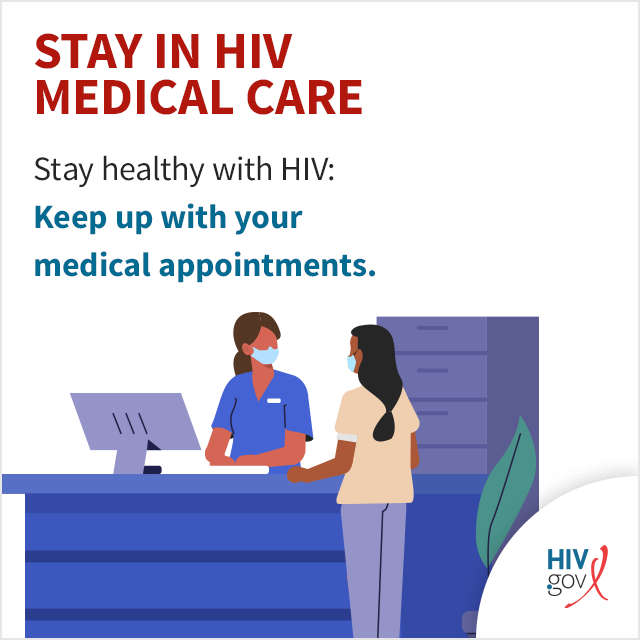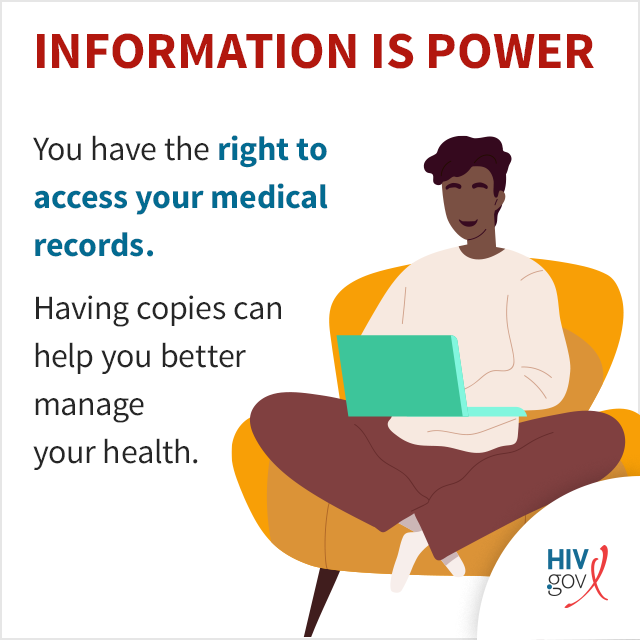Seeing Your Health Care Provider

Managing Your HIV Medical Appointments
With treatment, HIV is a manageable chronic condition. Part of staying healthy with HIV is seeing a health care provider regularly so that they can track your progress and make sure your treatment is working. That means managing your HIV medical appointments.
Some people with HIV go to an HIV clinic for their medical appointments; others go to a community health center, a Veterans Affairs clinic, or a private medical provider’s office. In addition to seeing your primary HIV health care provider, during a visit you also may need to see a specialist or access the special skills of a nurse, pharmacist, nutritionist, social worker, case manager, or patient navigator, depending on your needs. Preparing a plan can help make this easier.
Frequency of Appointments
Current HIV treatment guidelines recommend that most people with HIV see their health care provider for lab tests every 6 months. Some people may see their provider more frequently, especially during the first two years of treatment or if their HIV viral load is high or detectable. People with HIV who take HIV medicine (called antiretroviral therapy or ART) exactly as prescribed and have an undetectable viral load at every test for more than two years usually only need to have their lab tests checked twice a year. An undetectable viral load is a level of HIV in your blood so low that a standard lab test can’t detect it.
People with HIV who take HIV medicine exactly as prescribed and get and keep an undetectable viral load can stay healthy and will not transmit HIV to an HIV-negative partner through sex.
What About Telehealth?
Some HIV clinics and providers offer telehealth appointments, which are great way to get the health care you need when in-person appointments may not be possible or convenient. Telehealth is the use of technologies to receive care when you and your provider aren’t in the same place at the same time. Through telehealth, you may be able to talk to your doctor over the phone, by videoconferencing, through chat messaging, or through other apps.
Telehealth isn’t a perfect fit for everyone and there may be times when your provider may still have you come in for an in-patient visit or go to a lab for necessary lab tests. Discuss the advantages and disadvantages of telehealth with your provider and what options are available to you. Learn more about telehealth.

Before Your Visit
Whether you are meeting with your provider in person or via telehealth, these tips can help you better prepare for your visits:
- Start with a list or a notebook. Write down any questions you have about HIV or your treatment before you go. (See the list of sample questions below.)
- Make a list of any symptoms or problems you are having. These may include difficulties taking your HIV medications, sleeping issues, feelings of sadness or anxiety, or issues with intimacy.
- Bring your medications. Bring the medication bottles for any HIV medications, non-HIV medications, over-the-counter medications, vitamins, or supplements you are taking. If that’s not possible, bring a list of the names and dosages of your medications or take pictures of your medication bottles. Include a list of any HIV medications you may have taken in the past and any problems you had when taking them.
- Bring a copy of your medical records if your provider does not already have them, including visits to specialists. You have the right to access your medical recordsExit Disclaimer and having copies can help you keep track of your previous lab results, prescriptions, and other health information. It can also help a new provider have a better understanding of your health history.
- Be prepared to talk about any changes in your living situation. This includes changes in your relationships, insurance, employment, or housing that may affect your ability to take your medication as prescribed, keep up with your HIV appointments and treatment, or to take care of yourself. Your care team may be able to connect you with resources or services to assist you.
- Be on time. Do your best to plan ahead. If you are late, your provider may not be able to see you the same day.
During Your Visit
- Be prepared for lab tests. If your provider wants to run some lab tests during or following your visit, make sure you understand what they’re for and what your provider will do with the results. If you don't understand, ask your provider to explain it in everyday terms. Typically, you will be asked to give a sample (blood, urine) during your visit. Your provider’s office will call you with your results in a few days or may post them in an online patient portal. Keep track of your results and call your provider back if you have any questions.
- Be honest. Your provider needs to have the most accurate information to help you manage your care and treatment. Talk about any HIV medication doses you have missed. Tell your provider about your current sexual or alcohol/drug use activities and your history. These behaviors can put you at risk of developing resistance to your HIV medications or getting other sexually transmitted infections (STIs) as well as viral hepatitis. Your provider will work with you to develop strategies to stay as healthy as possible.
- Describe any side effects you may be having. Your provider will want to know how the HIV medications are affecting your body in order to work with you to solve any problems and find the right combination of medications for you.
- Ask your provider about your next visit. Ask when it should be scheduled, what to expect, and what you should bring to that appointment.
- Track your upcoming appointments. Work with your case manager, if you have one, to develop a system to help you remember your appointments, such as signing up for phone, text, or email reminders.
Asking Questions and Solving Problems
It’s important for you to be an active participant in your own health care and it’s your right to ask questions. You may need to direct your questions to different people, depending on what you need or want to know.
HIV health care providers (doctors, nurse practitioners, physician assistants) can answer questions about a wide range of issues that affect your health. These include:
- How much experience do you have treating HIV?
- How is HIV is affecting my body?
- What do my lab tests say?
- What do I need to know about medication changes, new medications, side effects, or whether it’s safe to take medications together?
- What can I do to prevent complications, such as opportunistic infections, and stay healthy?
- What are the signs that I might be getting an opportunistic infection or AIDS-related cancer?
- How can I prevent transmitting HIV to my sexual partner(s) or injection drug use partner(s)?
- How can I prevent or treat STIs and what should I do about any sexual symptoms I may be having?
- What do I need to know about family planning, including birth control options for me and/or my partner, and how to have children safely without transmitting HIV to them?
- Should I make certain changes in daily habits to help me stay healthy, such as quitting smoking?
- What do I need to know about substance use issues, including how alcohol/drug use can affect my HIV treatment and overall health, how to tell if alcohol use is a problem, and whether treatment might help me?
- What can I do about mental health symptoms I may be having, and can mental health treatment help me?
- Do I need referrals to specialists for other medical issues I may be experiencing?
- Do I need any possible surgical procedures?
- Am I up to date with my vaccines?
- Are there any clinical trials or research studies that may be relevant for me?
Nurses, case managers, or pharmacists can often answer any follow-up questions and can assist you in accessing a range of services that can help you succeed in treatment, particularly around:
- Understanding your HIV treatment plan, including how many pills of each medicine you should take; when to take each medicine; how to take each medicine (for example, with or without food); and how to store each medicine
- Understanding possible side effects from your HIV medication and what you should do if you experience them
- Developing medication adherence strategies and ways to overcome any challenges you may have keeping up with your medical appointments
- Getting services that can help you manage any issues that might impact your health, such as mental health or substance abuse treatment, housing assistance, food assistance, and other resources that exist in your community
- Helping you better understand lab reports, tests, and procedures
- Accessing insurance and pharmacy benefits you may be eligible for, and other aspects of paying for care and treatment
- Understanding other medical conditions you may have
- Getting help to quit smoking and resources that are available to assist you